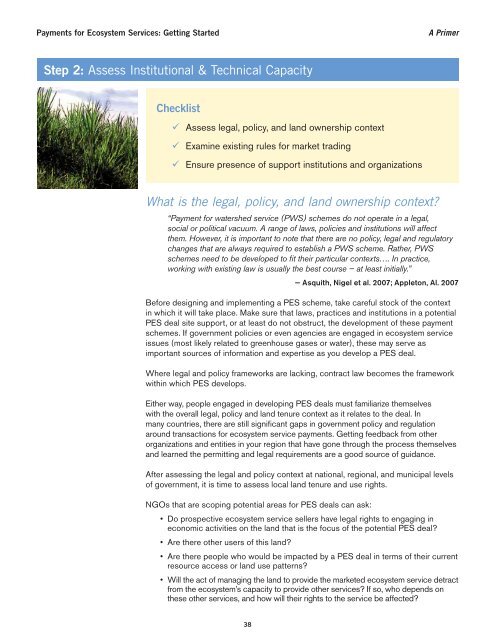Payments for Ecosystem Services: Getting Started. A Primer - UNEP
Payments for Ecosystem Services: Getting Started. A Primer - UNEP
Payments for Ecosystem Services: Getting Started. A Primer - UNEP
Create successful ePaper yourself
Turn your PDF publications into a flip-book with our unique Google optimized e-Paper software.
<strong>Payments</strong> <strong>for</strong> <strong>Ecosystem</strong> <strong>Services</strong>: <strong>Getting</strong> <strong>Started</strong><br />
A <strong>Primer</strong><br />
Step 2: Assess Institutional & Technical Capacity<br />
Checklist<br />
Assess legal, policy, and land ownership context<br />
Examine existing rules <strong>for</strong> market trading<br />
Ensure presence of support institutions and organizations<br />
What is the legal, policy, and land ownership context?<br />
“Payment <strong>for</strong> watershed service (PWS) schemes do not operate in a legal,<br />
social or political vacuum. A range of laws, policies and institutions will affect<br />
them. However, it is important to note that there are no policy, legal and regulatory<br />
changes that are always required to establish a PWS scheme. Rather, PWS<br />
schemes need to be developed to fit their particular contexts…. In practice,<br />
working with existing law is usually the best course — at least initially.”<br />
— Asquith, Nigel et al. 2007; Appleton, Al. 2007<br />
Be<strong>for</strong>e designing and implementing a PES scheme, take careful stock of the context<br />
in which it will take place. Make sure that laws, practices and institutions in a potential<br />
PES deal site support, or at least do not obstruct, the development of these payment<br />
schemes. If government policies or even agencies are engaged in ecosystem service<br />
issues (most likely related to greenhouse gases or water), these may serve as<br />
important sources of in<strong>for</strong>mation and expertise as you develop a PES deal.<br />
Where legal and policy frameworks are lacking, contract law becomes the framework<br />
within which PES develops.<br />
Either way, people engaged in developing PES deals must familiarize themselves<br />
with the overall legal, policy and land tenure context as it relates to the deal. In<br />
many countries, there are still signifi cant gaps in government policy and regulation<br />
around transactions <strong>for</strong> ecosystem service payments. <strong>Getting</strong> feedback from other<br />
organizations and entities in your region that have gone through the process themselves<br />
and learned the permitting and legal requirements are a good source of guidance.<br />
After assessing the legal and policy context at national, regional, and municipal levels<br />
of government, it is time to assess local land tenure and use rights.<br />
NGOs that are scoping potential areas <strong>for</strong> PES deals can ask:<br />
• Do prospective ecosystem service sellers have legal rights to engaging in<br />
economic activities on the land that is the focus of the potential PES deal?<br />
• Are there other users of this land?<br />
• Are there people who would be impacted by a PES deal in terms of their current<br />
resource access or land use patterns?<br />
• Will the act of managing the land to provide the marketed ecosystem service detract<br />
from the ecosystem’s capacity to provide other services? If so, who depends on<br />
these other services, and how will their rights to the service be affected?<br />
38
















